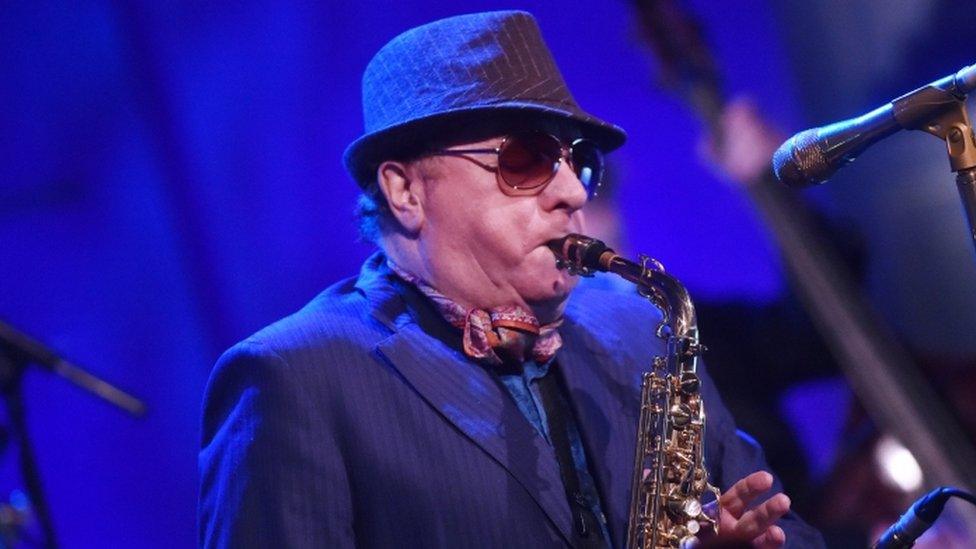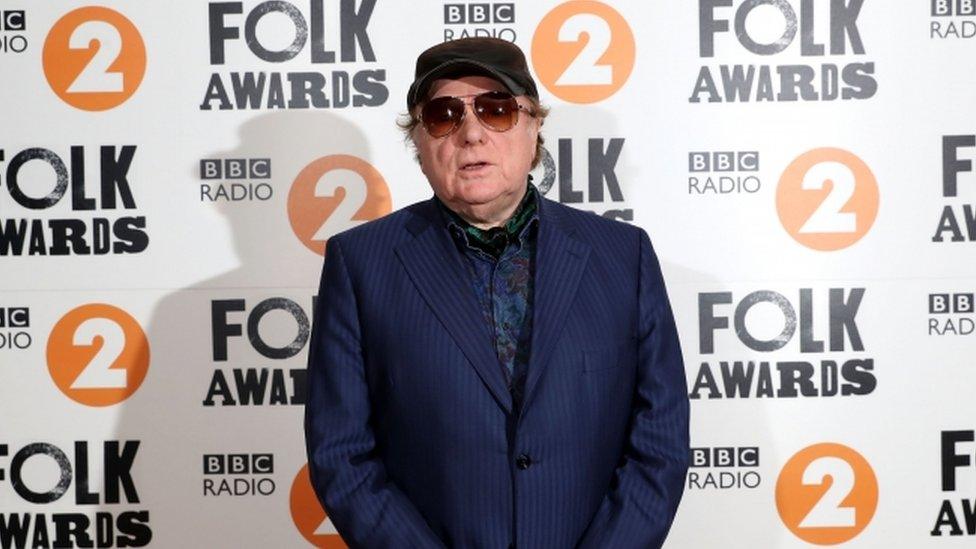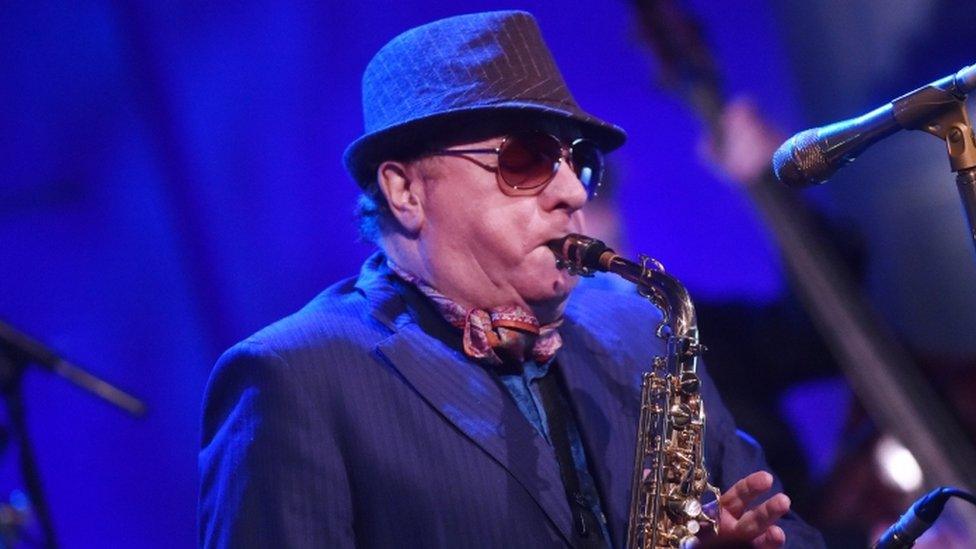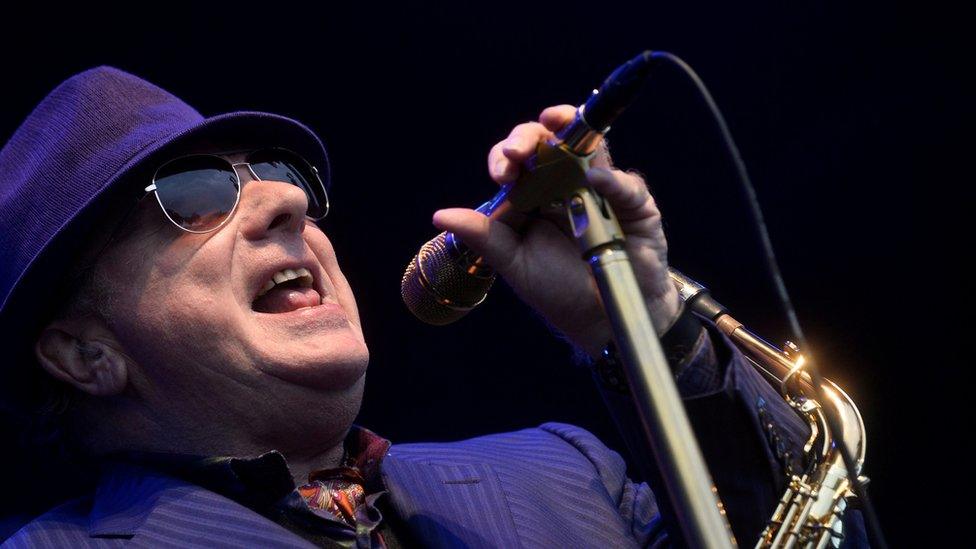Coronavirus: Sir Van Morrison ends legal action over live music ban
- Published

Sir Van Morrison has dropped a legal challenge against the "blanket ban" on live music in licensed venues in Northern Ireland.
It follows the Stormont Executive's decision to allow live music to resume as it eased Covid-19 restrictions.
The singer welcomed that decision but said he was disappointed he had to cancel concerts in the Ulster Hall in Belfast from 29 July.
Sir Van has been vocal in his criticism of Covid restrictions.
At the end of 2020 he released three lockdown protest songs.
In September, the musician performed at the London Palladium at a time when restrictions were in place in Northern Ireland.
He said: "For some reason, completely unknown to me, it [the ban] remained in force in Northern Ireland with catastrophic consequences for many artists, venues and the economy as a whole.
"As we look to the future, we need to understand the plan and strategy to support the arts and live music sector going forward as ultimately this helps support society as a whole. It's concerning that such considerations appear to have been forgotten."
'Compelled to act'
His solicitor, Joe Rice, said his client had "sought to engage constructively with government" on the issue.
"I know that Mr Morrison was disappointed by the failure on the part of the NI Executive to engage with him and that he was ultimately compelled to bring legal proceedings in order to achieve the lifting of the ban on live music for the benefit of fellow musicians, performers the live music sector as a whole," he said.
"He also believes that had the NI Executive engaged meaningfully with both Mr Morrison and the industry from the outset, more pre-planned events, such as his Europa Hotel and Ulster Hall concerts, could have proceeded as planned."
When legal proceedings were launched in January, a spokesman for the Department of Health said in response: "It is an accepted scientific fact that Covid-19 can spread when people are brought together in enclosed indoor locations.
"Stopping the spread of the virus is a priority for governments across the world - to save lives and stop health services being overwhelmed."
When Sir Van released his anti-lockdown songs in September, Northern Ireland Health Minister Robin Swann wrote a scathing opinion piece for Rolling Stone magazine in response.
Mr Swann said the songs were "dangerous", challenging Sir Van to present his own scientific facts.
The ban on live music was lifted in Northern Ireland as of 5 July. However there were limits placed on sound levels for indoor venues.
Sir Van said he was made aware of the decision to reopen venues without sound limits from 27 July when it was too late and the Ulster Hall concerts had been cancelled.


Van Morrison song alludes to debunked conspiracy theory
By Olga Robinson, BBC Monitoring disinformation team
Sir Van Morrison refers to a debunked Covid-19 conspiracy theory in one of his recent anti-lockdown songs.
The track As I Walked Out includes the lyrics: "Well on the government website from the 21 March 2020 / It said COVID-19 was no longer high risk".
It's a reference to a UK government page that stated "Covid-19 is no longer considered to be a high consequence infectious disease (HCID) in the UK".
That much is true - but that doesn't mean that coronavirus is harmless.
The HCID designation is given for very fatal diseases: for example Ebola, which kills more than 50% of infected people.
Covid-19 was initially classified as HCID in January 2020 - when little was known about it.
By March, more information and testing prompted authorities to revise the classification.
It's now thought the Covid-19 fatality rate is closer to 0.1%.
The government message was widely shared on social media, largely by coronavirus denialists and opponents of restrictions, who have cited it as "evidence" that the lockdown was based on a "hoax".

3 August 2021: This article was updated to include the most recent data.
Related topics
- Published20 January 2021

- Published22 September 2020

- Published18 September 2020
